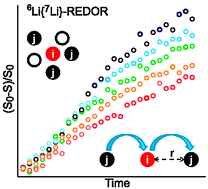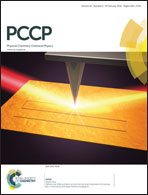The use of 6Li{7Li}-REDOR NMR spectroscopy to compare the ionic conductivities of solid-state lithium ion electrolytes†
Abstract
Garnet-like solid-state electrolyte materials for lithium ion batteries are promising replacements for the currently-used liquid electrolytes. This work compares the temperature dependent Li+ ion hopping rate in Li6BaLa2M2O12 (M = Ta, Nb) using solid-state 6Li{7Li}-REDOR NMR. The slope of the 6Li{7Li}-REDOR curve is highly temperature dependent in these two phases, and a comparison of the changes of the REDOR slopes as a function of temperature has been used to evaluate the Li+ ion dynamics. Our results indicate that the Nb phase has a higher overall ionic conductivity in the range of 247 K to 350 K, as well as a higher activation energy for lithium ion hopping than the Ta counterpart. For appropriate relative timescales of the dipolar couplings and ion transport processes, this is shown to be a facile method to compare ion dynamics among similar structures.


 Please wait while we load your content...
Please wait while we load your content...